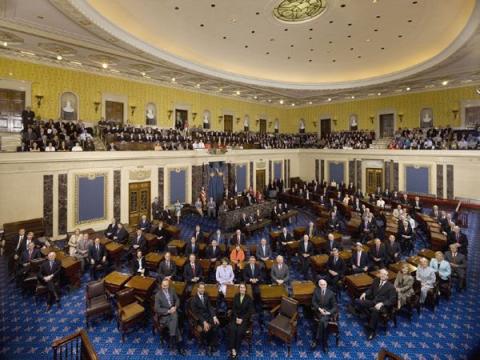Every two years approximately one-third
1. Max Baucus (Montana)
Baucus is the longest-serving US Senator in the history of Montana, having first won election in 1978. He has voted to allow concealed carry and was a major player in the passage of the Affordable Care Act.
2. Mark Begich (Alaska)
Begich is the former mayor of Anchorage and defeated Ted Stevens in 2008, the longest-serving Republican US Senator in history. In his term in the Senate, he has supported the Affordable Care Act, but representing Republican and independent-rich Alaska, Begich has advocated ANWR drilling and gun rights.
3. Chris Coons (Delaware)
Coons won election in 2010 to claim the seat vacated by Vice President Joe Biden. He defeated Tea Party candidate Christine O'Donnell.
4. Dick Durbin (Illinois)
The Democratic Senate Whip, the second-highest position in the party's Senate leadership, Durbin is nearing the end of his third term. Durbin is a force in the Senate for liberal causes such as passing health care reform and energy policy.
5. Al Franken (Minnesota)
Well-known as a comedian before defeating Republican Norm Coleman in 2008, Franken has used his position in the Senate to try to curtail the power of credit agencies that contributed to the financial crisis.
6. Kay Hagan (North Carolina)
Hagan came to the Senate after beating Republican US Senator Elizabeth Dole in 2008. Hagan was a supporter of the Affordable Care Act and worked to include provisions in the new law to benefit her constituents such as the Rural Physicians Pipeline Act to address the shortage of doctors in rural areas.
7. Tom Harkin (Iowa)
First elected to the US Senate in 1984, Harkin was also a contender for the Democratic presidential nomination in 1992. Harkin co-authored 1990's Americans with Disabilities Act.
8. Tim Johnson (South Dakota)
First elected to the US Senate after serving South Dakota's at-large congressional district, Johnson is nearing the end of his third term. Johnson's career has primarily involved appropriating earmarks including money for research grants, a children's home, and keeping open Ellsworth Air Force Base near Rapid City.
9. John Kerry (Massachusetts)
First elected to the US Senate in 1984, Kerry was the 2004 Democratic presidential candidate and is occasionally mentioned as a potential successor to Hillary Clinton as Secretary of State. In office, Kerry has served on the Senate Foreign Relations Committee and was a key player in the passage of New START, an arms reduction treaty.
10. Mary Landrieu (Louisiana)
A member of the moderate New Democrat coalition, Landrieu is nearing the end of her third term. She is currently the Chairwoman of the Senate Committee on Small Business and Entrepreneurship.
11. Frank Lautenberg (New Jersey)
The oldest US Senator currently serving, Lautenberg was in the Senate from 1982-2001 before retiring and subsequently returning in 2003. A supporter of legislation for public transportation, Lautenberg will be 90 years old in 2014 and has not indicated whether he will retire again.
12. Carl Levin (Michigan)
First elected to the US Senate in 1978, Levin is the Chairman of the Senate Committee on Armed Services. With Republican Senator John McCain, Levin was a co-sponsor of the controversial 2012 National Defense Authorization Act.
13. Jeff Merkley (Oregon)
Defeating two-term incumbent Gordon Smith in 2008, Merkley broke with many in his party in 2009 by opposing the re-confirmation of Federal Reserve Chairman Ben Bernanke and again in 2011 when he voted against the debt ceiling compromise.
14. Mark Pryor (Arkansas)
First elected in 2002, Pryor was one of seven Democrats in the so-called "Gang of 14" to block Republican implementation of the "nuclear option" to halt Democratic filibusters of Republican judicial appointments. Serving a culturally conservative state, Pryor has broken with his party on abortion, supporting it only in cases of rape, incest, and to protect the life of the mother.
15. Jack Reed (Rhode Island)
Reed was first elected to the US Senate in 1996. In his tenure, he has compiled one of the more liberal voting records in the Senate.
16. Jay Rockefeller (West Virginia)
Although from one of the wealthiest families in the world, Rockefeller has achieved a liberal voting record that has focused on poverty reduction and health care reform. If he decides to run for re-election in 2014, Rockefeller will be attempting to win his sixth term.
17. Jeanne Shaheen (New Hampshire)
Defeating Republican incumbent John Sununu in 2008, Shaheen is the first woman to represent New Hampshire in the US Senate. During her first term, Sheheen has worked on energy issues with Republican Susan Collins.
18. Mark Udall (Colorado)
Elected to the US Senate in 2008, Udall comes from a well-known political family after serving in the House of Representatives. It was Udall's proposal that the two parties sit side-by-side for the 2011 State of the Union address and not separated as they usually do.
19. Tom Udall (New Mexico)
Like his cousin, Tom Udall was also elected to the US Senate in 2008 and is on the Senate Foreign Relations Committee.
20. Mark Warner (Virginia)
A former governor of Virginia, Warner was first elected in 2008. During his time in office, Warner has worked on deficit reduction plans.
